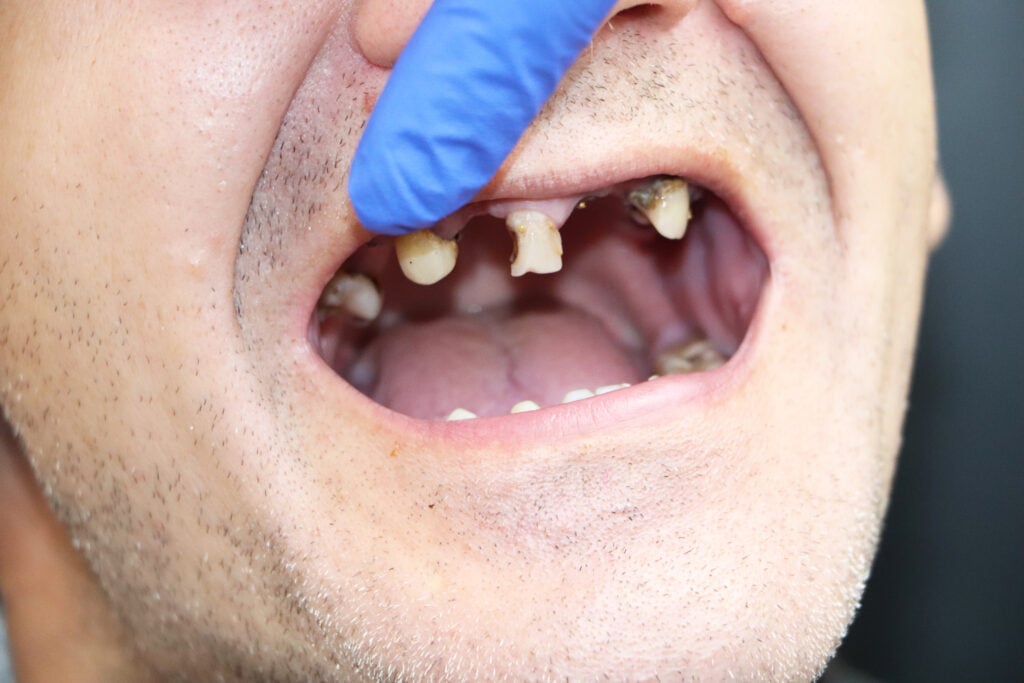
Contents
- 1 Why It’s Essential To Replace Your Missing Teeth ?
- 2 How Tooth Loss Can Affect the Functionality of Your Teeth
- 3 Affects The Way You Bite
- 4 Can Result In Gum Disease
- 5 Can Cause Further Tooth Loss
- 6 What Are the Common Procedures To Replace Your Missing Teeth
- 7 Partial Dentures
- 8 Dental Bridges
- 9 Dental Implants
- 10 Still Unsure About Replacing Your Teeth?
If you’ve had the unfortunate experience of losing a tooth, don’t worry! You are not alone. The Australian Institute of Health and Welfare found that people between ages 15-24 have an average of 2 teeth missing, while those 65+ usually end up without 11 or more total pearly whites (i know what it’s like). Discover why replacing your lost member is essential for restoring balance and restoring your smile properly with these treatments!
When missing teeth affect your bite and speech, it can cause pain and discomfort. Various treatments are available for restoring dental health and enhancing the appearance of a smile! The best option will depend on individual circumstances.
Why It’s Essential To Replace Your Missing Teeth ?
Tooth loss can dramatically affect your oral health and overall well-being. So if you lose teeth, it’s essential to treat the condition immediately for other aspects like gum or jaw bone structure to remain stable.
The functionality concerns are more vital than cosmetic issues caused by missing teeth. Missing teeth lead to serious dental problems and affects other parts of our bodies, such as your ability to chew food properly.
You see, there are two main reasons you may want to replace a missing tooth:
Appearance: The first is if your smile looks abnormal or not symmetrical. It’s an obvious flaw that you would like to correct urgently.
Functionality: The second reason would happen when someone has lost all teeth due to periodontal disease or an accident. It can badly impact the functionality of the remaining teeth, gum, and jawbone.
How Tooth Loss Can Affect the Functionality of Your Teeth
While most people become concerned about the cosmetic implications of tooth loss, it affects functionality and bites. If you don’t treat your missing tooth gap on time, it can result in further tooth loss and other oral health issues. Each tooth in your mouth does its functions effectively. So, losing any of them can affect the functionality of the remaining teeth, gums and jaw bones.
Affects The Way You Bite
Commonly, most people don’t notice their teeth shifting towards the gap created by tooth loss around their mouth. However, it may result in the misalignment of teeth and bite. In addition, it can make you put unnecessary pressure on the remaining teeth resulting in more complicated dental issues.
If you find that your bites are not efficient or pain-free when eating certain foods because the tooth is drifting towards the gaps, then see a dentist solve all those problems.
Can Result In Gum Disease
Gum disease resulting from tooth loss can lead to serious health problems such as tooth decay, jaw pain or infections. If you get an infection in the part of the gum that suffers tooth loss, you will likely develop the disease.
If you don’t give attention to your gum disease, it can cause further tooth loss with other oral and physical complications. Want to keep your healthy then read our blog on how to keep your teeth and gum healthy.
Can Cause Further Tooth Loss
When teeth are overused, they can lead to further loss of the tooth in question. When there’s nothing for your tooth in the adjacent jawbone to chew against, it can cause your teeth to overgrow. It can make you place more pressure on the other remaining teeth and can crack or break apart. It creates an even worse situation.
What Are the Common Procedures To Replace Your Missing Teeth
Partial Dentures
There are a lot of different options when it comes to replacing lost teeth. One such option is partial dentures, which work by clipping onto another healthy tooth (s) in your mouth and holding their position using an adhesive or elastic band. It allows you to feel comfortable while eating meals. Using this option, you can replace as many missing teeth as you want.
This procedure’s upside is that it is less expensive than full dental prosthetics. What’s not so great about partial dentures is that food can get stuck easily in partial denture gaps, and you may feel uncomfortable using them.
Dental Bridges
The second option is a bridge. Bridges are good because they can be cemented onto your teeth like a bridge over water. It will help you maintain the same bite force as before while restoring some lovely chewing power.
In addition, dental bridges are an excellent option for those who have lost one or more teeth. They act like artificial teeth, providing the necessary support and functionality.
Dental Implants
Dental implants may provide a long-term solution for tooth loss. A titanium root replacement is placed in the partial bone and permanently fixed with metal screws that hold it into place so that you can chew on your own again.
Dental implants are the best solution because they don’t just replace your tooth’s visible part. Instead, an implant’s root can help improve oral health and decrease the chances of gum disease, receding gums, or bone loss.
Still Unsure About Replacing Your Teeth?
Maybe this will be your first tooth loss, and all that enters into mind is, “It’s only one tooth!” While technically correct–you could go without support for the area around the extraction site to retain functionality. But you will have to face the consequences of not having the help of the missing tooth in the long term.
We know that our body has many parts with different functions and roles. For example, we have 32 teeth and losing one of them puts pressure on the remaining teeth when your bite or chew your food. Similarly, it affects the functionality and support of the jaws.
There’s no doubt that tooth loss can be pretty painful, but it doesn’t have to affect your smile. Many people are more concerned with maintaining the appearance of their teeth than they might think. So, it will be of great help if you consider replacing your missing teeth before it’s too late.
For more information, contact Designer Smiles at (02) 8074 1722 or book an appointment online.
Frequently Asked Questions
You have a few options if you have missing teeth. One option is to replace the missing teeth with a dental implant. Dental implants are titanium screws inserted into the jawbone to provide a base for a replacement tooth.
Another option is to replace the missing teeth with a dental bridge. A dental bridge is a metal frame attached to two healthy teeth on either side of the missing tooth and holds a replacement tooth in place.
A third option is to replace the missing teeth with dentures. Dentures are removable false teeth that fit over the gums and are held in place by suction or by adhesive paste.
Replacing all teeth can be expensive, depending on the type of dental work you need. If you want a more affordable option, consider getting a denture. A full denture can cost anywhere from $500 to $1,500, while a partial denture can cost anywhere from $300 to $900. The cheaper option may not be as durable or aesthetically pleasing as the more expensive options.
However, you can also consider the following before making a decision:
- One option is to replace all teeth with dental implants. While this option is more expensive than other options, it is also the most durable and long-lasting.
- Another option is to replace all teeth with dentures. Dentures are less expensive than dental implants but are also less durable and may need to be replaced more often.
- A third option is to replace only the missing or damaged teeth with dental implants or dentures. It is the least expensive option but tends to be the least durable
Yes, you can get implants if you have no teeth. However, getting dental implants may be more complicated if you have no teeth, and its success may depend on the health of your jawbone and oral tissues.
The first step in getting dental implants is to see a dentist for a consultation. The dentist will check your oral health and determine whether you are a good candidate for dental implants. If you have no teeth in your mouth, the dentist will likely refer you to a specialist who can help you undergo the implantation process.
Implants are generally more successful if some bone structure remains in the jawbone. If there is little or no bone structure remaining, the dentist may recommend using a bone graft to rebuild the jawbone before implantation. It is better if you can see a specialist get the implants.
Yes, it is possible to get dentures if you have no teeth. Dentures are false teeth that are made to look like natural teeth and are used to replace missing teeth. There are two types of dentures – partial dentures and complete dentures. Partial dentures are used to replace a few missing teeth, while complete dentures can replace all of the missing teeth.
Your dentist will most likely recommend complete dentures if you have no teeth. Full dentures are custom-made to fit your mouth and can be either plastic or metal. They usually have the base and false teeth (or prosthetics).
However, the type of dentures that are best for you will depend on your gums and jawbone condition. For example, if you have severe gum disease or bone loss, getting a complete set of dentures may be necessary. On the other hand, if you only have a few missing teeth, then a partial set of dentures may be a better option.
If you are planning for dentures, it is essential to see a dentist for an evaluation. Dentists can assess your oral health and determine whether you are suitable for dentures. They can also explain the different types of dentures available and help you choose the right style for your needs.
A dental implant can support a maximum of 8 teeth.
A dental implant is a titanium screw inserted into the jawbone to replace a missing tooth. It is anchored in place by a small abutment protruding from the gums. Once the implant has healed (a process that can take several months), a crown, bridge, or denture can be attached to the abutment.
Dental implants are popular as they are more secure and durable than traditional bridges or dentures. They also preserve the jawbone and help prevent facial collapse. However, they are not always appropriate for everyone; for example, people with severe gum disease or diabetes may not be eligible for treatment.

